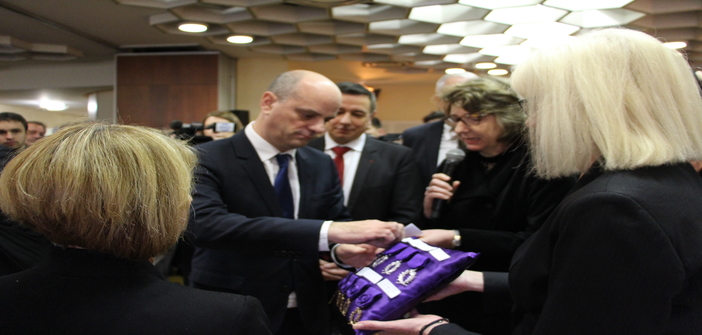The Minister of National Education, Jean-Michel Blanquer, visited the Académie de Nice. It was an opportunity for him to explain the choice of new measures taken this year.
A first visit to the capital of the Côte d’Azur awaited Minister Emmanuel Macron yesterday, which was very eventful. Welcomed by Christian Estrosi, it was at the Nice rectorate that Jean-Michel Blanquer spoke before teachers, the prefect of Alpes Maritimes, the rector of the academy, and some elected officials. He then presented academic honors.
« Your profession makes great sense because you have one of the most beautiful missions there is, that of national education », he declared, addressing the teachers. The minister is keen to pay tribute to the million staff of national education. He highlights their responsiveness because they have been « able, in a few weeks, to have all the elements for the continuation of the preparation for the new school year that you did, while also including elements of change in the spirit of national education, which is: aiming for student success. »
Between the splitting of CP classes, the homework program, and the reform of the baccalauréat… he wants to establish the “school of trust.”
« We trust the teachers of France, teachers must trust families, families must trust teachers. Teachers must trust their students, students even more so in their teachers, and teachers must trust their institutions. », assured Jean-Michel Blanquer.
Kindergarten: acquiring confidence
His primary priority remains that children must acquire self-confidence before entering primary school. To impart this, he relies on kindergartens, which must be « enriching and where inequalities can be offset through language ». They will provide a fundamental basis for primary school. Thus, this establishment will be a place where children acquire all the assets to prepare to learn reading, writing, and arithmetic.
Pupils will leave school “knowing how to read, write, and count”
The Minister of Education explained that the first elements are not sufficient to make an assessment, but the splitting of CP and CE1 classes is certainly « the most effective », according to studies. He announces: « This is what the President of the Republic has assumed, what the people have approved, and this is what we are doing now ». The first elements show that it offsets inequalities and helps to make a good start in life. Thus, pupils will leave primary school « knowing how to read, write, count, and respect others ».
A standout measure in middle school
Always with the aim of combating inequalities, the homework program is « concrete and has changed family lives ». As a reminder, this program, initiated after the All Saints’ Day holidays, allowed homework to be done after school, in middle school, and for free.
4 major high school reforms
Regarding high school, a major reform has been implemented, and three are awaiting reports. In short, for the reform of access to higher education, a new platform has been set up, called “Parcoursup”.
The minister explains that the reform of the baccalauréat is the subject of the visit to Paul Augier High School: « Today, through the visits we are going to make, we will set back into its general context what must happen before high school, as well as the different elements of high school and its environment ». Moreover, the reform of vocational education and the reform of apprenticeships are still pending.


